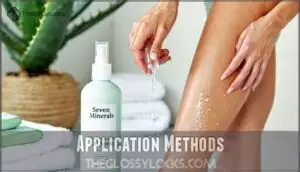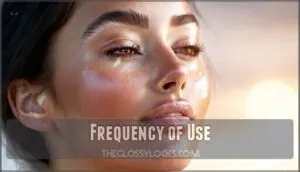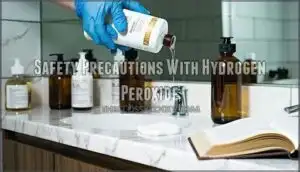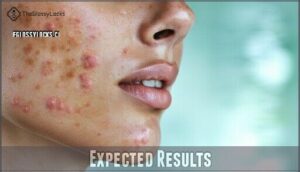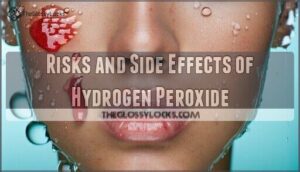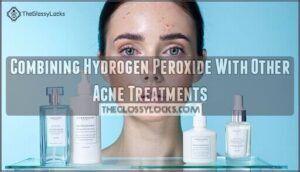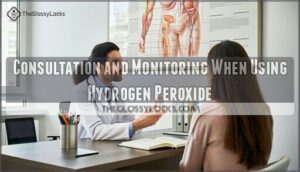This site is supported by our readers. We may earn a commission, at no cost to you, if you purchase through links.
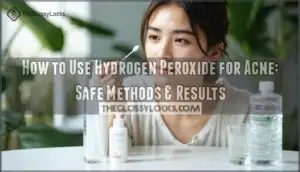
This antiseptic kills bacteria and dries out blemishes, but it’s not your skin’s best friend if used carelessly.
Start with twice-weekly applications and always patch test first—your face isn’t a science experiment.
While it might clear stubborn breakouts, hydrogen peroxide can cause redness, peeling, and irritation faster than you can say "oops."
Think of it as a nuclear option rather than daily routine.
The secret lies in knowing exactly when and how to harness its power without turning your complexion into a war zone.
Table Of Contents
- Key Takeaways
- How to Use Hydrogen Peroxide for Acne?
- Using Hydrogen Peroxide for Acne
- Safety Precautions With Hydrogen Peroxide
- Effectiveness of Hydrogen Peroxide on Acne
- Risks and Side Effects of Hydrogen Peroxide
- Combining Hydrogen Peroxide With Other Acne Treatments
- Consultation and Monitoring When Using Hydrogen Peroxide
- Frequently Asked Questions (FAQs)
- Can I put hydrogen peroxide on my acne?
- Are you supposed to use hydrogen peroxide on cuts?
- What kills acne bacteria fast?
- How to remove age spots with hydrogen peroxide?
- Can I use hydrogen peroxide on a pimple?
- How long will my skin be white from hydrogen peroxide?
- How to use hydrogen peroxide to remove blackheads?
- Can hydrogen peroxide clear acne?
- Can you use hydrogen peroxide on your skin?
- Why do I get pimples when I use hydrogen peroxide?
- Conclusion
Key Takeaways
- Dilute properly and start slowly – You’ll need to mix 3% hydrogen peroxide with equal parts water and begin with twice-weekly applications to avoid chemical burns and skin damage.
- Use it as a spot treatment only – You should apply the diluted solution directly to individual pimples with a cotton swab rather than treating your entire face, leaving it on for a maximum of 5 minutes before rinsing.
- Patch test first and monitor reactions – You must test the solution on your inner forearm for 24 hours before facial use and watch for redness, burning, or irritation that signals you should stop treatment.
- Consider it a last resort, not a daily routine – You’re better off using proven acne treatments like benzoyl peroxide or salicylic acid, as hydrogen peroxide can damage healthy skin cells and potentially worsen breakouts with regular use.
How to Use Hydrogen Peroxide for Acne?
Using hydrogen peroxide for acne requires a careful approach that respects your skin’s needs. This common household antiseptic targets acne causes by killing bacteria that contribute to breakouts.
Before applying this natural acne remedy, you’ll need to understand your skin types and the hydrogen properties that make it effective yet potentially harsh.
Start with a patch test on a small area to gauge your skin’s reaction. Dilute 3% hydrogen peroxide with equal parts water, then apply sparingly to affected areas using a cotton swab.
This pimple removal method works best as spot treatment rather than an all-over acne treatment, supporting your acne prevention routine alongside other natural remedies. Understanding acne fast relief methods can also help you develop a thorough skincare plan.
Using Hydrogen Peroxide for Acne
You’ll need to dilute household hydrogen peroxide to 1% concentration before applying it to acne-prone areas using a cotton ball or pad.
The application should remain on your skin for no more than five minutes before rinsing thoroughly with water to prevent irritation and potential skin damage, ensuring you follow this step carefully to avoid damage.
Application Methods
Hydrogen peroxide acne treatment requires careful topical application to minimize skin irritation.
Proper skin preparation and concentration levels determine treatment success. Understanding the effects of acne treatment products is essential for effective treatment.
Application Tips for Safe Treatment:
- Dilution Ratios: Mix 2 tablespoons water with 1 tablespoon 3% hydrogen peroxide for safer application
- Cotton Swab Method: Dab diluted solution directly onto whiteheads using cotton swabs for precise targeting
- Rinse After: Leave on for 5 minutes maximum, then rinse thoroughly with cold water
Frequency of Use
Finding the right balance with hydrogen peroxide requires careful timing. Daily limits matter substantially when using this acne treatment. You’ll want to start with once-daily application frequency to gauge your skin’s tolerance.
Most dermatologists recommend specific treatment schedules based on your skin type and acne severity.
| Frequency | Duration | Best For |
|---|---|---|
| Once daily | 1-2 weeks | Mild acne |
| Every other day | 2-3 weeks | Sensitive skin |
| 2-3 times weekly | Ongoing | Maintenance |
Following proper usage guidelines prevents skin irritation while maximizing benefits. Monitor your skin’s response and adjust dosing intervals accordingly.
Higher concentration products require less frequent use to avoid adverse reactions.
Safety Precautions With Hydrogen Peroxide
You’ll need to take specific safety measures before applying hydrogen peroxide to your skin, as this powerful oxidizing agent can cause burns, irritation, and permanent bleaching if used incorrectly.
Proper dilution and patch testing aren’t optional steps—they’re essential safeguards that prevent serious skin damage and help you determine whether your skin can tolerate this treatment.
Patch Testing
Before jumping headfirst into hydrogen peroxide treatment, you’ll want to perform a patch test to avoid unwanted surprises.
Apply diluted hydrogen peroxide to your inner forearm and wait 24 hours to check for reactions.
Key patch test steps:
- Choose an inconspicuous area like your inner forearm
- Apply a small amount of diluted solution
- Monitor for irritation signs like redness or burning
- Wait full 24 hours before proceeding with facial application
Understanding skin care routines is essential for effective acne treatment.
Dilution Guidelines
After completing your patch test, proper dilution becomes your safety net.
Never use hydrogen peroxide straight from the bottle – it’s like bringing a sledgehammer to crack a walnut. Concentration ratios matter: mix one part 3% hydrogen peroxide with two parts distilled water for a gentler 1% solution.
These mixing guidelines aren’t suggestions; they’re safety measures that prevent chemical burns. Dilution methods should always involve distilled water, not tap water with impurities.
Stick to application rates of twice weekly maximum. Remember, stronger doesn’t mean better in acne treatment – your skin will thank you for following proper skin care protocols.
Effectiveness of Hydrogen Peroxide on Acne
You’ve probably wondered whether hydrogen peroxide can actually clear your acne, especially since it’s sitting right there in your medicine cabinet.
The research shows mixed results: while hydrogen peroxide can kill acne-causing bacteria and dry out pimples temporarily, scientific evidence doesn’t support it as a safe or effective long-term acne treatment.
Mechanism of Action
Understanding how hydrogen peroxide works reveals its dual nature.
This powerful oxidizing agent creates free radicals that target acne-causing bacteria through oxidative stress.
Its antiseptic properties kill microorganisms while promoting skin oxidation.
However, this same process can damage healthy fibroblast activity, potentially slowing wound healing.
The mechanism that fights acne inflammation may also harm beneficial skin cells.
Effective treatment often involves using a fast acting acne solution to minimize damage and promote healing.
Expected Results
When you apply hydrogen peroxide correctly, you’ll likely notice acne reduction and inflammation decrease within days.
This acne treatment helps dry existing pimples while promoting skin improvement. However, healing time varies by person, and results aren’t guaranteed for acne removal or scar minimization.
- Expect redness reduction within 2-3 days of proper application
- Pimples may shrink faster compared to untreated breakouts
- Acne solution works best on inflammatory lesions, not blackheads
- Don’t expect miracle results – hydrogen peroxide uses are limited
- Acne scars won’t disappear; focus on preventing new damage
Risks and Side Effects of Hydrogen Peroxide
While hydrogen peroxide can target acne-causing bacteria, you’ll face significant risks that may outweigh any potential benefits.
You can experience skin irritation, chemical burns, increased scarring, and bleaching effects that permanently alter your skin tone, especially if you have darker skin.
Skin Reactions
Beyond its acne-fighting promise, hydrogen peroxide can trigger serious skin reactions that’ll make you think twice.
Your skin might rebel against this harsh treatment through:
- Skin Irritation – Redness causes immediate discomfort and stinging
- Burning Sensations – Intense heat that signals tissue damage
- Itching Responses – Persistent scratching worsens acne inflammation
- Scar Formation – Permanent marks from skin burning incidents
Allergic Responses
While most people tolerate hydrogen peroxide well, you might experience allergic reactions ranging from mild skin irritation to severe anaphylaxis risk.
Watch for dermatitis symptoms like redness, burning, or blistering after application. Your body’s histamine response can trigger hives or swelling.
If you notice any allergic reaction beyond minor skin burns, stop using it immediately and consult your doctor. Safety first!
Combining Hydrogen Peroxide With Other Acne Treatments
Mixing hydrogen peroxide with other acne treatments can lead to unexpected skin reactions and reduce the effectiveness of both products.
You’ll need to understand which ingredients work safely together and which combinations should be avoided to prevent irritation or chemical burns.
Compatibility With Skincare Products
You’ll want to check how hydrogen peroxide fits into your skincare routine.
Product interactions matter, especially for acne prone skin.
Here’s what to watch:
- Concentration Limits: Keep hydrogen peroxide under 4% in skin care products
- Moisturizer Compatibility: Use oil-free options to prevent ingredient reactions
- Skin Types: Monitor sensitivity levels closely
- Acne Skin Care Routine: Space treatments to avoid overwhelming your skin
Understanding proper acne skin care is essential for effective treatment.
Avoiding Interactions
Medication interactions can turn your skincare routine into a chemical battlefield.
Don’t mix hydrogen peroxide with benzoyl peroxide or retinoids—these combinations trigger severe skin sensitivity and allergic responses.
Your skin can’t handle multiple harsh ingredients simultaneously.
Drug conflicts increase side effects like burning and peeling.
Monitor concentration levels carefully when layering products.
If you experience unusual reactions or persistent irritation, stop using all treatments immediately.
Smart skincare means understanding how ingredients interact before applying them to your face, which is key to avoiding a chemical battlefield and ensuring smart skincare with minimal side effects and severe skin sensitivity.
Consultation and Monitoring When Using Hydrogen Peroxide
You’ll need professional guidance before using hydrogen peroxide for acne treatment, as dermatologists can assess whether it’s appropriate for your specific skin type and condition.
Regular monitoring becomes essential once you start treatment, since hydrogen peroxide can cause unexpected reactions or interfere with your skin’s natural healing process.
Professional Advice
Dermatologist guidance proves invaluable before starting hydrogen peroxide acne treatment. Your skin care professional can assess your specific needs and recommend appropriate treatment options.
During your acne consultation, discuss:
- Current acne severity and skin type
- Proper hydrogen peroxide concentration for your condition
- Compatible skin care products and routines
- Alternative acne management strategies if needed
A thorough acne consultation process is essential for determining the best course of treatment. Medical opinion guarantees safer, more effective results, and dermatologist guidance is crucial for invaluable advice on acne treatment.
Long-Term Management
Professional guidance remains essential for longterm acne management using hydrogen peroxide.
Your dermatologist will monitor treatment duration and adjust your skin regimen based on results.
Since hydrogen peroxide can increase acne scars management challenges, they’ll recommend healing strategies and maintenance tips for acne prevention.
Regular checkups guarantee your acne treatment stays effective while minimizing risks.
Alternative forms of treatment may be suggested if complications arise during your acne skin care journey.
Effective acne treatment methods, such as those using acne prevention techniques, can substantially improve long-term outcomes.
Frequently Asked Questions (FAQs)
Can I put hydrogen peroxide on my acne?
Ironically, while hydrogen peroxide kills acne bacteria, it’s not your skin’s best friend.
You can use it sparingly on inflammatory pimples, but dilute it first and rinse after five minutes to avoid irritation.
Are you supposed to use hydrogen peroxide on cuts?
You shouldn’t use hydrogen peroxide on cuts anymore.
Doctors now recommend simply rinsing wounds with clean water instead.
While it kills bacteria, hydrogen peroxide can damage healthy cells and actually slow down healing.
What kills acne bacteria fast?
Studies show acne bacteria can multiply every 20 minutes in clogged pores.
Benzoyl peroxide kills bacteria fastest, working within hours.
You’ll see results in 2-3 days, but start slowly to avoid irritation and dryness, using Benzoyl peroxide.
How to remove age spots with hydrogen peroxide?
Hydrogen peroxide isn’t recommended for age spots.
It can cause skin irritation, burns, and permanent pigment changes.
You’ll get better results with dermatologist-approved treatments like retinoids, vitamin C serums, or professional laser therapy.
Can I use hydrogen peroxide on a pimple?
Walking a tightrope between help and harm, you can use diluted hydrogen peroxide on pimples sparingly.
Mix one part 3% peroxide with two parts water, apply for five minutes, then rinse to avoid irritation, using it sparingly.
How long will my skin be white from hydrogen peroxide?
The white coloring from hydrogen peroxide typically fades within 10-15 minutes as oxygen bubbles dissipate.
If you’ve applied a strong concentration, the whitening may last several hours before your skin returns to normal.
How to use hydrogen peroxide to remove blackheads?
Why risk damaging your skin when hydrogen peroxide won’t effectively remove blackheads?
It’s ineffective against non-inflammatory acne like blackheads and cysts.
Instead, use salicylic acid or retinoids for safer, proven results.
Can hydrogen peroxide clear acne?
You might see temporary improvements, but hydrogen peroxide isn’t recommended for acne treatment.
It can damage healthy skin cells, increase scarring risk, and cause irritation.
Stick with proven acne treatments instead.
Can you use hydrogen peroxide on your skin?
Can hydrogen peroxide truly transform your skincare routine?
You can use hydrogen peroxide on your skin, but proceed with caution.
It’s harsh and may damage healthy cells, causing irritation, burns, or scarring with improper use.
Why do I get pimples when I use hydrogen peroxide?
You’re likely experiencing irritation from hydrogen peroxide’s harsh oxidizing properties.
It damages healthy skin cells, disrupts your skin barrier, and can trigger inflammatory responses that actually worsen breakouts instead of clearing them, which is due to its harsh oxidizing properties.
Conclusion
Like wielding Excalibur, learning how to use hydrogen peroxide for acne requires wisdom and restraint.
You’ve discovered it’s a powerful antiseptic that can tackle stubborn breakouts, but it’s not without risks.
Start cautiously with diluted solutions, patch test religiously, and limit use to twice weekly.
Monitor your skin’s response closely and don’t hesitate to consult a dermatologist if irritation occurs.
Remember, effective acne treatment balances aggressive intervention with gentle care—your skin will thank you for the thoughtful approach.
- https://academic.oup.com/jac/article/67/7/1589/733761
- https://insights.ovid.com/pubmed?pmid=19131809
- http://onlinelibrary.wiley.com/doi/10.1111/j.1067-1927.2005.00072.x/abstract;jsessionid=EE267A44878039683E433DA1C0EA611B.d01t04
- https://www.ncbi.nlm.nih.gov/pmc/articles/PMC5607474/
- https://journals.lww.com/jtrauma/Abstract/2009/01000/Mechanisms_of_Delayed_Wound_Healing_by_Commonly.10.aspx

